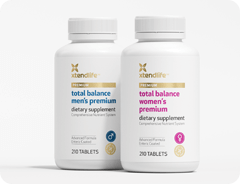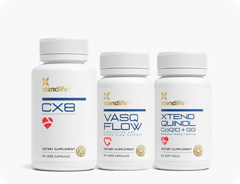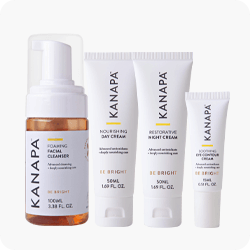Most experts will say if there’s one supplement that should be part of your routine, it’s an omega-3 fatty acid. According to the experts at WebMD.com, omega-3 fatty acids may lower cholesterol levels, reducing the risk of heart disease, ease the joint pain and stiffness of rheumatoid arthritis, and help prevent depression while boosting the effects of antidepressants.
With so many supplements out there, it’s easy to get overwhelmed with choice. If you don’t take the right supplements specifically suited for your needs, you could be missing out on all the associated benefits. If you take too many supplements, you could be doing more harm than good, not to mention wasting money. So how do you know what you should, and shouldn’t, be taking? Most experts will say if there’s one supplement that should be part of everyone’s diet, it’s an Omega-3 fatty acid.
Omega-3 fatty acids have a plethora of health benefits, from reducing the risk of heart disease to slowing down the aging process. What’s not to love about this superstar of the nutrient world?
Your body can’t make its own omega-3 fatty acids, so they must come from dietary sources. The American Heart Association recommends two servings of fish per week to meet dietary needs.
Food sources
Eating real food containing the nutrients you need is always preferable when possible. Eating fish with high levels of both DHA and EPA will help meet your omega-3 needs. They include:
- Anchovies
- Bluefish
- Herring
- Wild-caught salmon
- Sardines (these little fish are also high in Vitamin D)
- Lake trout
- Tuna
Fish with high levels of mercury or other toxins include mackerel, wild swordfish, tilefish and some sharks, and intake should be limited. ALA (alpha-Linolenic acid) is another omega-3 fatty acid found in plants, making it a good option for vegans to boost the omega-3 levels in their diets. Sources include flaxseed, walnuts, olive oil, canola oil and soybean oil.
While eating fish and other whole foods is ideal, most people don’t eat enough to get the essential Omega-3s needed. With so much information out there, it can be hard to figure out what supplement is right for us.
A tale of two fish oils
You probably know by now that the benefits of fish oil reach far and wide – it’s good for your heart, brain, memory, skin, inflammation and mental condition to name a few. But while fish oil is now revered for its many health benefits, not all fish oil is made equal.
For every fish oil that is crafted with good health in mind, there are many others on the market that offer little by way of benefits.
Many fish oil suppliers harvest their oil from fish caught off the coast of South America, which is then shipped to refining facilities where it’s processed – either with high temperatures or chemicals – in much the same way vegetable oil is crafted.
Before Xtendlife developed its first fish oil product, we looked at how the others were doing it, and decided to do it differently. Our fish oils are made from Hoki fish harvested off the coast of New Zealand, an area of the Southern Ocean that is amongst the most pristine in the world, as well as exceptionally pure tuna oil.
Our research showed even though it’s well established that much of the benefits from fish oil come from the DHA and EPA, there are essential components in natural fish oil which are lost when the oil goes through a concentration process to increase the levels of DHA and EPA.
So, we did something that no one else in the industry had done and took natural Hoki oil in a non-concentrated form and blended it with a very highly concentrated tuna oil. This gave us the best of both worlds-natural fish oil with all the components intact but also with high levels of Omega-3 and in particular DHA.
Green-lipped mussel: an exotic, effective, Omega-3
Green-lipped mussels are a good source of polyunsaturated fatty acids (PUFAs) – a group that includes omega-3s as well as some eicosatetraenoic acids (ETAs) – green-lipped mussel has power-packed nutritional benefits.
While Green Lipped Mussel offers great benefits, the modest Omega-3 content means you should supplement with additional Omega-3. Xtendlife Green-Lipped Mussel Powder is designed to help support the joints in coping with the discomfort associated with joint problems, soothe aches and pains from exercise or aging, stiffness from repetitive motions and inflammation.
Green-lipped mussel also contains natural forms of glucosamine and chondroitin. These assist in making it a powerful workhorse when it comes to joint health support.
While most processing erases many of the benefits of the green-lipped mussel, the mussels we use are transformed from fresh, live mussels to the finished product in 30 minutes. This ensures the end product is as fresh and close to its original state as possible.

Krill oil – why it’s not good value for money
Krill oil is an interesting product but compared to fish oil it’s not good value for money. Before buying krill oil, think about this:
- Claims that krill oil is more sustainable than fish oil are unsubstantiated. Krill is caught solely to be converted into oil for supplements. Because the entire marine ecosystem starts with krill, reducing the amount of it in the ocean could severely impact the food chain, specifically whales which need large amounts of krill to sustain their metabolism. Xtendlife’s fish oil does not impact fish resources as the Hoki and tuna fish that provide the oil are also used for human consumption.
- Marketers of krill oil also claim it’s more beneficial than fish oil because it contains astaxanthin. However, the amount found in krill is a fraction of the amount we use in our Premium and QH Ultra fish oils. Manufacturers of krill oil often add more astaxanthin to bring their product up to the levels of astaxanthin found in Xtendlife fish oils supplements.
- In terms of Omega-3 content, you get more DHA (the Omega-3 fatty acid most readily absorbed and used by the body, especially the brain) by taking Xtendlife fish oil products than you would by taking krill oil. The cost per mg/DHA is also significantly less.
Reference:
- http://www.webmd.com/healthy-aging/omega-3-fatty-acids-fact-sheet


 Supplements
Supplements Bundles
Bundles









